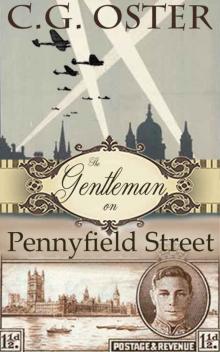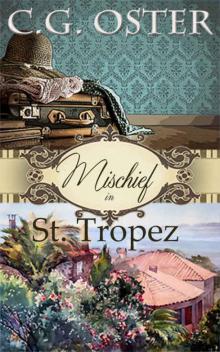- Home
- C. G Oster
Mischief in St. Tropez Page 11
Mischief in St. Tropez Read online
Page 11
The maitre’d had lost interest and Dory thanked him before leaving. Riquier was a district she didn’t know well, it was known for dense houses and the location of many of the tradesmen in the city. It wasn’t a tiny place, but Dory knew it was the kind of neighborhood where the people knew each other.
One of the tram lines would take her straight there and she could relax for a moment and simply watch the busy streets of Nice pass her by. They were busy, but there did seem to be fewer people than the last time she had visited, which was only a week or so back. More people had to be leaving. Dory wondered if Lady Summernot and her sister had managed to find passage out.
Maybe it was time to broach the topic with Lady Pettifer as well. The emptying streets were alarming to see. It felt as though the whole world was anticipating something terrible.
Chapter 20
M arie proved not that hard to find. Dory asked a few vendors and eventually she was led to a second story apartment above a pharmacy. Marie lived with her mother in a small apartment and seeing it, Dory wished the baron’s family actually had something for her. Although the chances that they would give any consideration to a girl like Marie were low.
Dory smiled as they sat down in the apartment’s tiny reception room. The furniture was old and worn, but well serviced.
“I am trying to find out what happened to Baron Drecsay,” she explained as Marie and her mother waited expectantly with their hands in their laps. Marie was very pretty with dark hair and lovely eyes. It wasn’t a wonder she had caught the baron’s eye. “I have not been able to find any enemies. But I think you know him better, and I was hoping you could set me on the right path.”
“You wish to find who killed him? It wasn’t me.”
The police must have given her a hard time, Dory presumed. She would be the logical suspect. Ridley had told her to look for jealousy or greed first. “Did you observe any specific jealousy amongst his friends?”
“Nothing he was worried about. He liked to have friends of higher position than himself.” It had to be Prince Barenoli she was referring to.
“There are some that say that Baron Drecsay was a spy.”
Marie laughed. “No, he hated the Germans. Probably they say that because he was friends with Barenoli. Barenoli is only here because he cannot go home. Neither of them are spies. Only stupid people think that. Besides, Drecsay… he didn’t like to do difficult things. He liked the easy life. He gets that woman to pay for everything.”
“You mean Countess Tirau.”
“Stupid woman.” There was definitely a hint of jealousy there—or was it resentment.
“But with her death, her support ended. Did he inherit anything from her?”
“No, she gave him nothing!” Marie sounded offended. “All the work he did whispering compliments in her ear and she gave him nothing.”
“One of his friends said he had some scheme to rebuild his family wealth. Did he say anything to you?”
“He always had ideas. He spoke of ideas, but he never did anything. Too lazy.”
Dory had to wonder if Marie had even liked him. Or was she as dependent on him as he was on Countess Tirau? Did none of these people have the wherewithal to stand on their own feet and have true relationships? With a shake of her head, Dory dismissed the thought. Her judgment wasn’t serving her at this moment. “I understood the countess was very generous, at times.”
“Every once in a while, she would do what Drecsay wanted. Gifts here and there. Jewelry.”
“Anything of note?”
“She gave him a car. Some land to build a house.”
“She gave him land?”
“Yes, down in Antibes. Not good land. Average land.”
“Do you think anyone would kill him for this land?”
“It was nothing more than farm land. I don’t know. When I went, it wasn’t much. Mr. Henri can tell you more.”
“And who is Mr. Henri?”
“He is the countess’ advokat.”
“Her solicitor? Do you know where I can find him?”
Marie shrugged. “I never met him.”
They talked some more, but Dory wasn’t getting anything else that resembled a motive. Marie, as it turned out, didn’t like Prince Barenoli, but he was rich, the woman pointed out. That forgave him a great deal, Dory assumed. Neither did she like Terry. He drank too much and was handsy. There were also other friends. Drecsay had a lot of friends.
When Dory brought up the subject of Livinia, Marie’s face darkened and she called her a stupid English girl. Well, there was certainly jealousy there. It just wasn’t directed at Drecsay, even though Marie’s anger probably should have been. Women did tend to blame the other woman instead of the man who was inflicting the damage—as if they were incapable of taking responsibility for their own actions. But Marie had never met Livinia, or even knew what she looked like.
There seemed to be nothing else Marie could tell her. Drecsay liked to drink, liked to be the life of the party. And he had enjoyed his time after the countess’ control had finished, but his finances had dwindled. Still, he hadn’t seemed overly worried.
Bidding goodbye, Dory left, her mind mulling over the things that Marie had said. She painted the picture of a young man who cared little for consequences. In saying that, it seemed Drecsay had turned his attention to marriage and was seeking the most profitable return from it. Livinia had obviously been a target, and for someone like him, it would have been a good step.
Dory shuddered trying to imagine the life they would have—living here on the coast, slowly burning through Livinia’s inheritance. Sadly, it wasn’t a fate that would unduly disturb Livinia. She, too, would be happy to be the life of the party here on the coast—until the money ran out. But for her, perhaps the money would never entirely run out. She had her own Countess Tirau in her father.
It was a fate that Lady Pettifer would deeply disapprove of, but it was questionable how much control she had over Livinia. Livinia was a young woman of age. It wasn’t as if anyone could blatantly tell her what to do. Maybe Marie was right and she was a woman bound to make stupid decisions. Drecsay was no longer in the picture, so perhaps there was hope for her to settle into a good marriage with a half-decent man. Some girls seemed allergic to decent men, though.
The tram took her back to where she had started outside the Hotel Carlone. Right on time, Vivian showed up sans Livinia.
“Livinia is staying,” he said, waiting for Dory to get in.
“You didn’t feel like staying yourself?”
He didn’t answer her question. “So what did you discover in your investigations?”
“It seems Drecsay was looking for an heiress and had his sights on Livinia.”
Dory could see the muscle in Vivian’s cheek working. He did not like hearing that. If he had been around, Dory had to concede he would have had motive for murder. He’d been nowhere near, otherwise, Dory would have to suspect him again, like she had for the other murder investigation she had been a part of.
“Apparently the countess had given him some land down by Antibes. The girl said it wasn’t particularly valuable land, but enough for him to build a house on.”
“Land isn’t hard to get around here.”
“No, I suppose not,” Dory admitted.
“Hard to think anyone would murder for a bit of land.”
“People have killed for less. I suppose it depends on who inherits the land.”
“Some distant relative in Hungary, no doubt. Whoever has inherited the title. So if you find some mysterious Hungarian hanging around, then you might have your man. Someone who would come all the way here to dispatch of a penniless baron for a worthless piece of land.”
In Vivian’s book, the land might be worthless, but he lived on an entirely different scale from most people. To someone like Marie, that land would be a fortune, even if she hadn’t been impressed by it when she’d visited with Drecsay. Like Drecsay with his countess, Marie would inherit nothing f
rom Drecsay. It could be said that she had lost more than anyone out of his death.
Vivian drove, his attention on the road. The sun was setting, painting glorious colors on the horizon. Again, Dory was struck with how beautiful it all was. But it was also starting to feel like an illusion, a distraction. “There were fewer people in Nice than the last time we visited.”
“People are leaving,” he said, but didn’t elaborate further.
“What are you going to do about your conscription?”
For a moment, he looked over at her, then back at the road. “Well, I can’t hang out here forever. Sooner or later, I will have to go back.”
“Some would say that you could stay here and avoid it.”
“Not if I ever want to show my face in society again,” he said. Dory hadn’t realized there would be such pressure. Ridley had alluded to it as well. “People are scrambling for excuses for their sons not to go, but deride others for it. It is the very height of hypocrisy. None of us are true conscientious objectors—we just object to our family members being called to serve.”
They drove in silence for a while. This war seemed to be steamrolling ahead, unable and unwilling to take a moment to pause and reflect. “Is there any going back now?” she asked.
“It would be a miracle.”
Chapter 21
I t would be hard to see how some farmland in Antibes would be a motive for murder,” Lady Pettifer said as they sat in the dark around the dining table, lit only with candles. Livinia had not returned, and was in the bosom of her social circle for the night. Dory still didn’t understand why Vivian had returned home. Perhaps he’d had enough. It could be that he didn’t particularly enjoy the company of what was effectively Livinia’s friends. They were a bit younger, perhaps.
“It would be truly something desperate.”
“I will try to call this Mr. Henri,” Dory said. “By the name, it is hard to tell whether he is English or French.”
“Perhaps the countess’ family can shed some light. I don’t exactly know how to reach them.” Lady Pettifer looked ponderous. “It wouldn’t be something that her friends and acquaintances would know.”
“Maybe I should try to reach Inspector Moreau,” Dory said with a notion of dread. The inspector seemed less than willing to speak to her. “It’s worth a try.”
“Try it in the morning. We should be quite insistent. If they prove difficult, I could ask Major Dodds to call him.”
“Who’s Dodds,” Vivian asked.
“The British consul in Nice. He can put a bit of pressure on the French authorities if we need him to.”
“Useful,” Vivan said. He looked bored as he sat and nursed his wine, or it could be the candlelight that displayed him so. Dory had to wonder if something had happened, or if it was the conscription that weighed heavily on him. That would be understandable. Dory couldn’t even imagine what it would feel like to receive such a letter, to be forced to go off to war.
Earlier in the day, he had mentioned that they were recruiting educated men to be officers, which meant him. It was hard to imagine him as someone in charge of a platoon of men. Dory wasn’t sure that was the right term, but Vivian would be directing men in the war effort. And Ridley. Ridley seemed more of a natural choice. He had directed men before, but what skills did Vivian really have?
Putting the uncomfortable thoughts away, she returned her mind to Drecsay, which seemed less confrontational to think about. There was no hint of a culprit yet, but the land was a lead she felt they needed to follow.
“Shall we listen to the news?” Lady Pettifer said and rose. “I could use a sherry, I think. Dory, would you like one?”
“I could handle a small one,” Dory replied. After all this time with Lady Pettifer, Dory had learned to enjoy a sherry. Initially, it hadn’t agreed with her, but over time, her appetite had learned to crave some after supper.
“Mr. Fernley, would you be so good as to turn on the wireless.”
The man moved to do so and sharp static invaded their ears for a moment. The remnants of some melody played its last cords. They had made it just in time.
This is the BBC from London, the disembodied voice said gravely. These are today’s main events. Germany has invaded Luxembourg, Belgium and the Netherlands. Both houses of Parliament have been summoned at six o’clock this evening, and the cabinet has met from eleven this morning to prepare our response. The French Parliament has also been meeting today. What news there is comes chiefly from broadcasting stations in Luxembourg City, Amsterdam and Brussels.
They all exchanged concerned looks, but no one spoke. They had been driving around Nice today and no one had been the wiser that Germany was marching across Europe toward them.
Allied troops are preparing their response, and so are our forces in Lille, both mobilizing to meet the Germans.
“It is starting,” Lady Pettifer said, her voice completely toneless.
“Our troops will beat them back,” Vivian stated. Dory could see the concern in his eyes. She’d actually never seen him truly concerned before.
The presenter went onto detail the resistance being put up in each of the countries to the invading army.
“They’re invading three countries at once,” Dory said, still not believing what she was hearing. “There wasn’t so much as a peep when we were in Nice. It was just a normal day.” She knew full well she was babbling, but she didn’t know what else to do with the fear that bubbled up inside her. The Germans were invading, taking the small countries before they marched through to France. Would the French really stop them, like Vivian had asserted? Dory hoped so.
“Turn it off, Mr. Fernley,” Lady Pettifer said. The silence was jarring and no one spoke.
“We have to leave,” Vivian said after a while.
“I thought you said the French would hold them,” Dory asserted.
“When have the French ever held anything. We have to leave. Getting rid of the landed gentry was the first thing the Germans did when they invaded Poland.”
Lady Pettifer grimaced. “It is very worrying that the Germans seem to be attacking the civilian population. Very worrying indeed. But all this is happening up north. If not the French, then our troops will beat them back. It is all far away from here.”
Vivian rose sharply and paced. Everyone seemed to be saying one thing and then the opposite.
“I might get some fresh air,” Dory said and rose herself. Tears were forming in her eyes and she needed some time alone to deal with the emotions that were running away with her. So she walked out into the darkness of the garden outside. The moon was out and lit the landscape around her. It was utterly silent as if the coastline itself didn’t care what the stupid people milling on its surface was doing. She felt stupid—on behalf of people in general, she felt stupid. This was a stupid thing to do—war, what use could it possibly serve. It would cause wholesale misery to everyone and for that?
Breathing rapidly, Dory had to slow down or she would start to hyperventilate. Her hopes had been that they would sort this—that it was all posturing and they would sort themselves out. Stupid people were leading them into war, and now they would all suffer. Life as Dory had known it was ending and something awful was going to take its place. Their lovely lives here on the coast could not continue. They had to leave.
Everything had seemed so distant before, but now the ugliness that had been brewing was chasing them away. It was even forcing Ridley and Vivian into the very war itself.
Coming across a bench, she sat down and stared out at the calm sea. Why did everything have to end?
She sat for ages, unable to deal with other people right now, or commiserate with their worry and concern. Too many worries circled around her own heart to have room for the concerns of others. In a sense, she was holding herself back from blind panic and couldn’t afford to let anyone test her resolve.
After a long while, she saw headlights snake along the coast road in the distance. Did they know what had happe
ned? Had their life effectively been torn apart too? Or were they blissfully unaware? Just a short while ago, Dory had been blissfully unaware.
Eventually the motorcar drew closer and Dory saw it veer in. It was coming this way. It had to be Livinia. She must have heard. Were the glittering party things in Cannes also panicking?
It really was time to head back, and Dory forced herself to rise. Suddenly, she felt exhausted. It was as though she had used up all her emotions at once and was now left completely empty.
The headlights of Livinia’s motorcar, probably Richard’s, swung around the tree as it pulled up next to the house.
“Have you heard?” Livinia’s voice demanded inside the house. “It’s unbelievable. I don’t understand. This fucking war! They ruin everything.”
Livinia’s tirade wasn’t far off what Dory was feeling.
“Everyone is shocked,” Richard’s voice came. “No one knows what to do. There’s talk of midnight escapades across the country. They say we should pack up this minute and just drive north or west.”
“It serves no one to head off like a headless chook,” Lady Pettifer said. “In the morning, we will call Major Dodds and see what he says. We must be orderly with this.”
Richard cleared his throat and sat down. “They say the Duke and Duchess left their lunch half eaten and fled earlier today. They must have been told before the announcement on the news. They just left everything and fled.”
“Not a word,” Livinia said. “They could have warned the rest of us.”
“Perhaps they wanted clear roads for their escape,” Vivian said and lit a cigarette. His panic had clearly subsided, and he was more or less back to his usual caustic self. Dory had to admire his resilience. “I bet they don’t half admire Herr Hitler so much now.”
“They were trying to avoid a war,” Livinia said in anger. “Maybe if they hadn’t been thrown out, they would have succeeded.”
“Children,” Lady Pettifer said. “We need cool minds. Tomorrow we’ll call the consulate and plan what we are to do.”

 The Summerfield Bride
The Summerfield Bride Secrets at Wallisford Hall
Secrets at Wallisford Hall The Gentleman on Pennyfield Street
The Gentleman on Pennyfield Street Mischief in St. Tropez
Mischief in St. Tropez